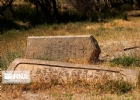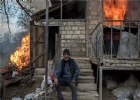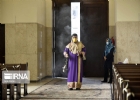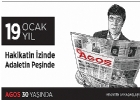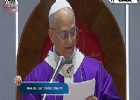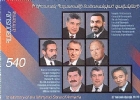
English :
03 Mart 2017
![]()
![]()
![]()
After seven years of uncertainty, it looks like the election of a new Armenian Patriarch is in the offing. In 2008, Archbishop Mesrob Mutafyan was incapacitated because of an incurable disease. He was reduced to a shell of his former self, having lost his mental faculties completely. On June 30, 2010, Archbishop Aram Ateshian was assigned as vicar general by the clergy council. During the intervening years, confusion has reigned in the Istanbul Armenian community, which has been divided into two camps: one seeking the election of a new Patriarch, and the other opting for a co-adjutor Patriarch.
Such a situation was indeed unprecedented in the history of the Patriarchate nor had the Armenian Church canons foreseen or addressed such a case.
The Turkish government responded to neither camp, thus letting the community languish in confusion.
On October 6, 2016, the General Clerical Assembly convened under the presidency of Archbishop Sahak Mashalyan and pronounced Archbishop Mutafyan retired, thus paving the way for a new election.
Archbishop Mutafyan was the 84th Patriarch and now the community is awaiting the election of the 85th.
The Istanbul Patriarchate has played a crucial role in Armenian history; it still is the head of the Armenian community in Turkey and maintains its place in the general hierarchy of the Armenian Church globally.
The Patriarchate was established after the fall of Constantinople in 1453 by Fatih Sultan Mohammad II. It was created to serve as a counterweight against the Greek Orthodox Patriarchate. It was used, abused and sometimes protected by succeeding Ottoman rulers. Since the Ottoman government had devised the Millet system, the conquered nations were governed through their spiritual heads. The sultan reached out to his Armenian constituency through the Patriarch, who consequently rose to a position of power. For a certain time in history, the Istanbul Patriarchate wielded more power than any other See in the Armenian Church hierarchy, including the two Catholicosates and the Patriarchate in Jerusalem.
The Sultans used the Istanbul Patriarchate as a political tool to control also the Patriarchate in Jerusalem, which was in competition with the Greek and Roman Catholic Churches in the Holy Land; as a consequence, Armenians also benefit from that competition. When Catholicos Sahak Khabayan was uprooted from the Catholicosate of Sis in 1914, he was declared by Jemal Pasha to be the supreme spiritual head of all Armenians, headquartered in Jerusalem, to counter Holy Echmiadzin, which was under Russian control.
The Armenian national constitution was ratified by the Sultan in 1863. Some principles and regulations from the constitution are still used by the Armenian churches and dioceses around the world, to this day.
Although technically the Armenian community does not need to ask for government permission to hold elections, the permission is supposedly to “oversee the orderliness of the election process.” That is, of course, a euphemism for government control. A fly cannot move in the Armenian community without the government’s sanction or permission, contrary to the Lausanne Treaty of 1923, which supposedly guarantees the internal freedoms of Turkey’s minorities.
It is not only President Recep Tayyip Erdogan that is complaining about the restrictions of that treaty; all his predecessors have agreed on this point and violated the clauses of the treaty with the collusion of its signatories.
There are 42 Armenian community charities (vakif) in Istanbul; those include churches, schools and hospitals. None of them has been allowed to hold elections for a long time. An official must have given a nod for the community to be able to take action and prepare for this election.
We must not have the illusion that anything has changed in Turkey. Any Patriarch must continue to serve the Turkish government first, before serving his community.
During a recent interview given to Civilnet, the currant Vicar General confessed that Archbishop Mutafyan was given an instruction sheet with talking points whenever he traveled overseas. At one time, he was forced to visit European capitals to promote Turkey’s bid to join the European Union, infuriating Armenians around the world.
That is the price a religious leader there has to pay to preserve the interests of his flock. Armenians outside Turkey must recognize the confines of the Patriarch’s responsibilities in Turkey.
Archbishop Ateshian’s letter to Erdogan against the vote in the German Bundestag recognizing the Armenian Genocide was out of line and characterized by his competitors in the Patriarchal election as “an act to promote his personal interests.”
At this juncture, there are four candidates. According to community leaders in Istanbul, the favorite candidate would be the Turkish-born Archbishop Khajag Barsamian, Primate of the Diocese of the Armenian Church of America (Eastern). But, he has refused to be in the race. That leaves the other four: Archbishop Aram Ateshian; Archbishop Sahak Mashalyan, Archbishop Karekin Bekjian, Primate of Armenians in Germany, and Archbishop Sebouh Chooljian, Primate of Gougark, in Armenia.
Besides the ability to serve the community and navigate through the legal and illegal mazes created by the Turkish government, the elected Patriarch must possess the moral character to uphold church unity around the world; with Antelias in open competition with Echmiadzin and the Patriarch in Jerusalem in an ugly revolt, it is a serious issue to maintain healthy relations with the Holy See while Turkey is domestically unstable.
It is too early to predict the outcome of the election. One thing is certain: the Turkish authorities have to gauge the level of loyalty to them, before allowing the public to vote.
Once vetted by the Turkish government, pundits in Istanbul believe that there will be an open and fair election.
During his tenure as Vicar General, Ateshian has ruffled some feathers. The editor of Agos, Pakrad Eutukyan, said that “he is not my choice.” The archbishop wishes to secure credit for the renovation of St. Giragos Church in Diyarbekir and Holy Cross Church on Akhtamar. Archbishop Bekjian has been most vocal in his bid for the office, yet many believe he has been away too long from the community to be in touch with the current mood there. Archbishop Chooljian, with a broader worldview, is still considered to be too assimilated to the culture of Armenia. Archbishop Mashalyan, very articulate and dignified, claims that he is not rushing to throw his hat in the rink, but will not turn down the honor if elected.
Turkish law requires that all the candidates be Turkish citizens. But violating the terms of the Lausanne Treaty, the government has closed down the Holy Cross Armenian Seminary and the Greek Seminary in Heybeli, which could prepare Turkish citizens as members of the clergy. They also forbid seminary students to be trained in other countries, in essence, cutting off routes for new candidates.
Despite all those manmade problems, it is a miracle that already four candidates are competing and that there are even a few more deserving ones serving other communities.
Armenians in Turkey are unanimous in vowing: “Whoever is elected will enjoy our respect.”
We cannot contradict them.
By Edmond Y. Azadian
�
�
Bu haber kaynağından gelmektedir.
Haber metninde yer alan görüşler haber kaynağı () ve yazarına ait olup,
bolsohays.com sitesi haber hakkında herhangi bir görüş üstlenmemektedir.
Opinions expressed are those of the author(s)-(). They do not purport to reflect the opinions or views of bolsohays.com
Diğer Haberler
-
Ohanian Becomes First Armenian-American to Receive Best Picture Oscar Nomination
-
Pashinyan Announces Beginning of Renewal of Armenian Apostolic Church
-
Azerbaijan-Armenia normalization push set to carry into 2026
-
Pashinyan Urges Karabakh Armenians to Embrace Armenian Citizenship for Security
-
Armenia adopts universal healthcare insurance
-
Armenia pays mothers $1,300 for each child born
-
Photography of Ancient Armenia Featured in New 2026 Wall Calendar
-
Pope asks for prayers ahead of visit to Türkiye and Lebanon
-
Armenia will step up its efforts toward membership in the European Union in 2026
-
Economy Minister discussed rebranding of Armenian brandy with producers
-
Aleppo - Yerevan - Aleppo
-
Mirzoyan: Armenia citizens should live in Armenia, Azerbaijan citizens should live in Azerbaijan
Foto Galeri Tüm Galeriler
Video Galeri Tüm Videolar
Anket Tüm Anketler
Günün Sözü
Մի ցանկար այն հարստութիւններուն, որոնք կրնան կորսուիլ։











